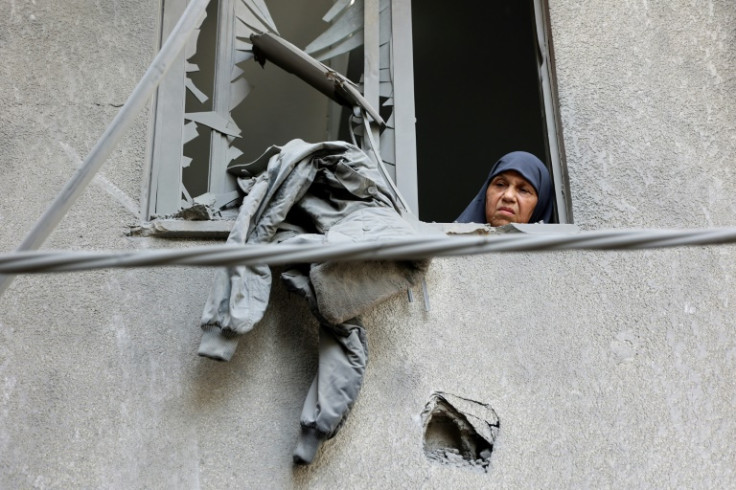
Israel reacted with fury after three European countries said Wednesday they would recognize a Palestinian state, more than seven months into the devastating Gaza war.
Ireland, Norway, and Spain said they would formally recognize the State of Palestine on May 28.
Israel strongly opposes the move, arguing that it amounts to "rewarding terrorism" after the Palestinian militant group Hamas launched its unprecedented October 7 attack on Israel which sparked the bloodiest ever Gaza war.
Israel said it was recalling its envoys to Ireland and Norway for "urgent consultations" and was expected to do the same with its ambassador to Spain.
Foreign Minister Israel Katz charged that "the twisted step of these countries is an injustice to the memory of the 7/10 victims."
Most Western governments including the United States say they are willing to one day recognise Palestinian statehood -- but not before agreement is reached on thorny issues like its final borders and the status of Jerusalem.
However, Spain's Prime Minister Pedro Sanchez charged that his Israeli counterpart Benjamin Netanyahu's campaign of "pain and destruction" in the Gaza Strip was now putting the two-state solution in "danger".
Norwegian Prime Minister Jonas Gahr Store said "recognition of Palestine is a means of supporting the moderate forces which have been losing ground in this protracted and brutal conflict".
"In the midst of a war, with tens of thousands killed and injured, we must keep alive the only alternative that offers a political solution for Israelis and Palestinians alike: Two states, living side by side, in peace and security."
According to the Palestinian Authority, which rules parts of the occupied West Bank, 142 of the 193 UN member countries already recognise a Palestinian state.
A senior Hamas figure, Bassem Naim, hailed the three European governments for their decisions.
"These successive recognitions are the direct result of this brave resistance and the legendary steadfastness of the Palestinian people," he told AFP.
"We believe this will be a turning point in the international position on the Palestinian issue."
Irish Prime Minister Simon Harris called the October 7 attack "barbaric" but added that "a two-state solution is the only way out of the generational cycles of violence, retaliation and resentment".
Hamas's attack on October 7 resulted in the deaths of more than 1,170 people, mostly civilians, according to an AFP tally based on Israeli official figures.
The militants also took 252 hostages, 124 of whom remain in Gaza, including 37 the army says are dead.
Israel's retaliatory offensive has killed at least 35,647 people in Gaza, mostly women and children, according to the Hamas-run territory's health ministry.
Israel also imposed a siege that has deprived Gaza's 2.4 million people of most water, food, medical supplies and fuel, and brought much of the population to the brink of famine.
Heavy fighting has raged around Gaza's far southern city of Rafah, the last part of Gaza to face a ground invasion, where an AFP team reported more air and artillery strikes early Wednesday.
Heavy battles have also rocked Gaza's northern and central areas where Hamas forces have regrouped, and more Israeli air strikes have hit Gaza City, Jabalia and Zeitun.
Ten people were killed in the central town of Al-Zawaida during the night, according to the Al-Aqsa Martyrs Hospital.
And the Gaza civil defence agency said six bodies were recovered from the rubble of a family house in Jabalia.
The World Health Organization has said northern Gaza's last two functioning hospitals, Al-Awda and Kamal Adwan, were besieged by Israeli forces, with more than 200 patients trapped inside.
Israeli troops began their ground assault on Rafah early this month, defying international opposition over fears for the more than one million civilians trapped in the city.
Israel has ordered mass evacuations from the city, and the UN says more than 800,000 people have fled.
Heavy fighting has also rocked the other major Palestinian territory, the occupied West Bank, where an Israeli raid entered its second day in the city of Jenin.
Explosions and gunfire were heard from inside the Jenin refugee camp, an AFP correspondent said, after eight Palestinians were killed Tuesday.
Amid the carnage of the Gaza war, Israel has faced growing international opposition to its devastating military campaign and siege.
International Criminal Court prosecutor Karim Khan said Monday he had applied for arrest warrants for leaders on both sides, including Israeli Prime Minister Benjamin Netanyahu.
US President Joe Biden backed Netanyahu in condemning the warrant request against Israeli leaders as "outrageous".
If granted by the ICC judges, the warrants would mean that any of the 124 ICC member states would be required to arrest Netanyahu and the others if they travelled there, although the court has no mechanism to enforce its orders.







